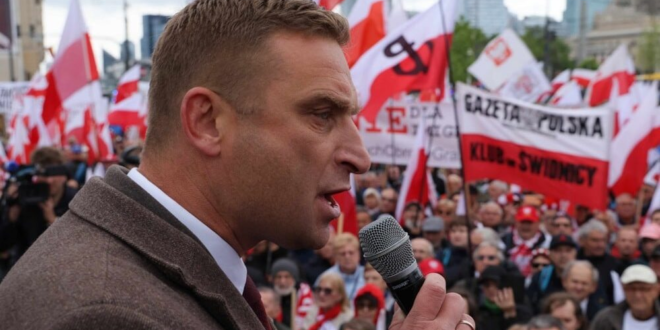For the first time, a march labelled specifically as “anti-immigration” took place in Poland on Saturday, even if the message has often been heard before on the streets of Polish cities, particularly during the annual Independence Day parades held on November 11.
Saturday’s protest took place in the last days of the election campaign to choose the country’s next president, during which the three favourites have all used anti-immigration rhetoric, targeting not only non-European migrants coming into Poland via the border with Belarus but also Ukrainians.
The main organiser of the event was the recently established Border Defence Movement (Ruch Obrony Granic), led by Robert Bakiewicz. This ultranationalist activist is well known in Poland for co-organising the annual Independence Day marches as well as ‘defending’ Catholic churches during the women’s rights protests back in 2020.
A more noticeable and active anti-immigration movement has been building in Poland over the last year or so.
So-called “Citizen patrols” first appeared on the border with Belarus, where a migrant crisis has been fomented by the regime of Aleksandr Lukashenko to destabilise the EU. These patrols detain migrants that they come across in the forest who have illegally crossed into Poland. Such citizen groups also began popping up in Polish cities last autumn, in one instance threatening a building where migrant workers lived in the small town Zyrardow, not far from the Polish capital.
Bakiewicz’s Border Defence Movement, formally set up in March this year, is also organising “citizen controls” at the border with Germany to prevent the returns of migrants to Poland, which are happening under the Dublin Regulation and a bilateral agreement struck between the two countries.
A participant of the National March Against Mass Immigration displays religious symbols during the march through the streets of Warsaw, Poland, on 10 May 2025. EPA-EFE/PAWEL SUPERNAK
Saturday’s march was attended by over a thousand people, mostly elderly, some bussed in from other cities by local clubs of Gazeta Polska, one of the main right-wing media outlets in the country, which has been organising local meeting clubs for several years.
Participants shouted slogans including “No to relocation, yes to reparations” – a reference to Germany, which has been sending back migrants who first entered the EU via Poland but has not paid war reparations demanded by the previous Law and Justice (PiS) government. Another slogan referred to the country’s prime minister, “Tusk is a traitor”.
Several PiS politicians were in attendance, including former education minister Przemyslaw Czarnek. Participants held banners in support of Karol Nawrocki, the PiS camp’s presidential candidate, and of Slawomir Menzen and Grzegorz Braun, two far-right politicians also taking part in the election.
A counter-demonstration organised by the United Against Racism initiative and the Warsaw Women’s Strike, among others, takes place in Warsaw, Poland, on 10 May 2025. The banner reads ‘Enough of racism and fascism!’ EPA-EFE/Pawel Supernak
At the same time, around 200 people attended an anti-fascist counter-demonstration, organised under the banner “Immigrants Are Welcome, Poland Is Our Common Home”.
Over a million Ukrainian refugees have settled in Poland since the full-scale invasion of their country by Russia in 2022, joining another million estimated to be already living there. About 240,000 Belarusians also live in Poland, many escaping political persecution at home.
Tens of thousands of non-European immigrants have attempted to cross into the EU via the Belarus-Polish border since 2021. Poland is also hosting an increasing number of economic migrants from outside the EU.
 Eurasia Press & News
Eurasia Press & News




